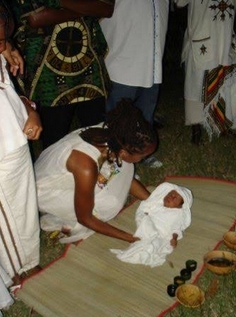
support@yorubalibrary.com
+2348073529208, 07038599574

Yoruba traditional birth rites are a significant aspect of the Yoruba culture, celebrating the arrival of a new life and ensuring the child's well-being and integration into the community. These rites involve various ceremonies, rituals, and customs that reflect the values, beliefs, and traditions of the Yoruba people. This article explores the key elements of Yoruba traditional birth rites, highlighting their meanings and cultural significance.
Pregnancy and Prenatal Care
Pregnancy is a revered and celebrated period in Yoruba culture, marked by special care and rituals to ensure the health of both the mother and the unborn child.
Prenatal Care
Practices:
• Herbal Medicine: Expectant mothers often use herbal remedies to promote health and ease pregnancy symptoms.
• Dietary Restrictions: Certain foods may be avoided to ensure the well-being of the mother and child.
Significance: These practices reflect the Yoruba's holistic approach to health, combining traditional medicine with cultural beliefs to support a healthy pregnancy.
Birth Rituals and Ceremonies
The birth of a child is celebrated with various rituals and ceremonies that honor the new life and protect the mother and child.
The Birth Itself
Tradition: Births typically take place at home, assisted by traditional midwives known as "Agbebi."
Significance: The home setting and the presence of the midwife ensure a familiar and supportive environment for the mother.
Naming Ceremony (Isomoloruko)
The naming ceremony, known as "Isomoloruko," is one of the most important birth rites in Yoruba culture. It usually takes place on the seventh or eighth day after the child's birth.
Ceremony:
• Prayers and Blessings: Elders and family members offer prayers and blessings for the child's health, prosperity, and long life.
• Name Selection: The child is given names that reflect family history, aspirations, and circumstances surrounding the birth.
Example: A child born during a period of joy might be named "Ayodele" (Joy has come home).
Significance: The naming ceremony connects the child to their heritage and community, bestowing a sense of identity and belonging.
Cleansing Rituals
Various rituals are performed to protect the newborn and ensure their spiritual and physical well-being.
Cleansing Rituals
Practice: Cleansing rituals, such as washing the baby with special herbs, are performed to purify the child and promote good health.
Significance: These rituals symbolize the removal of any negative influences and the beginning of a healthy life.
Role of the Family and Community
The birth of a child is a communal event in Yoruba culture, with family and community members playing active roles in the various ceremonies and celebrations.
Family Involvement
Practice: Family members, especially elders, are actively involved in the naming ceremony and other birth rites, offering wisdom and blessings.
Significance: This involvement reinforces the importance of family ties and the transmission of cultural values and traditions.
Community Support
Practice: The community often comes together to celebrate the birth, offering gifts and support to the new parents.
Significance: This communal support highlights the collective responsibility for the well-being of the child and the family.
Cultural and Spiritual Significance
Yoruba birth rites are imbued with deep cultural and spiritual significance, reflecting the values and beliefs of the Yoruba people.
Connection to Ancestry
Practice: The rituals and ceremonies connect the newborn to their ancestors and heritage, ensuring continuity and respect for tradition.
Significance: This connection fosters a sense of identity and belonging, grounding the child in their cultural roots.
Blessings and Good Fortune
Practice: The various rites are intended to bless the child with health, prosperity, and protection, setting the foundation for a successful life.
Significance: These blessings reflect the community's hopes and aspirations for the new generation, emphasizing the importance of positive beginnings.
Conclusion
Yoruba traditional birth rites are a rich and meaningful part of the Yoruba culture, celebrating the arrival of new life and ensuring the child's integration into the community. Through prenatal care, birth rituals, naming ceremonies, protective practices, and communal involvement, these rites reflect the deep cultural values and spiritual beliefs of the Yoruba people. Embracing and preserving these traditions helps to maintain the cultural heritage and foster a strong sense of identity and belonging.

Learn about the Yoruba concept of Ìwà Pẹ̀lẹ́ (good…

Learn special praises for Divine Being and Creator…